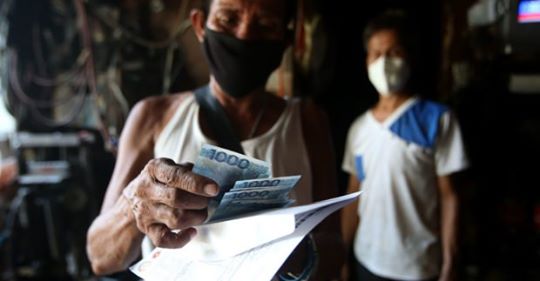Gov’t planning to halve number of cash aid beneficiaries
MANILA, Philippines — The country’s economic managers are planning to halve the number of household-beneficiaries of the government’s Social Amelioration Program since there will be fewer households under enhanced community quarantine this month.
The Department of Social Welfare and Development reported at a meeting of the Inter-Agency Task Force on Emerging Infectious Diseases that it would need from P77.6 billion to P133.1 billion to continue the dole out in May.
Finance Secretary Carlos Dominguez III said that the Department of Finance (DOF), the Department of Budget and Management, and the National Economic and Development Authority (Neda) voted to give away P77.6 billion to 11.5 million households, including 3.3 million “left out families in areas currently under ECQ.”
During the first month of the program, a total of 22.9 million families, including five million “left out” families, were given financeial assistance totaling P133.1 billion.
Thus, the entire program will cost the government more than P210 billion for both April and May but the World Bank (WB) had said in a report that the dole would “prevent an increase in post-COVID poverty, as estimates show a 3.3-percentage point increase in poverty, assuming no government intervention.”
Citing government data, the WB also warned that the incomes of informal workers and entrepreneurial activities would decline by 16.7 percent due to disruptions brought about by the lockdown.
The data cited by the WB were based on two surveys conducted by the DOF and Neda covering small businesses and consumers.
The DOF said on Sunday that it had rolled out a new survey together with the Manila-based multilateral lender Asian Development Bank that would be used to craft recovery programs for big business and industries affected by the pandemic.
Acting Socioeconomic Planning Secretary and Neda chief Karl Kendrick Chua said the new survey was “more quantitative and [will] dig deeper into the impact” of the pandemic on micro, small and medium enterprises and large firms alike.
Chua had said that last month’s survey among consumers generated 200,000 respondents, while the business survey collected 44,000 respondents, who mostly submitted their answered online or through their mobile phones.
It was from these surveys that Chua last week attributed the estimated cost of the lockdown—imposed in Luzon and other parts of the country since mid-March—on the economy so far: P700 billion in foregone output.
For his part, Dominguez said that the goal of the new survey was “to develop an appropriate and targeted program to assist the various sectors of the economy” and while response was voluntary, companies should participate if they want the government to develop a good program for their industry.
Disclaimer: The comments uploaded on this site do not necessarily represent or reflect the views of management and owner of Cebudailynews. We reserve the right to exclude comments that we deem to be inconsistent with our editorial standards.

